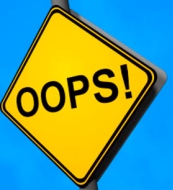 Want to fast track your development, boost your intelligence and be happier in every area of your life? Then do one thing – make mistakes.
Want to fast track your development, boost your intelligence and be happier in every area of your life? Then do one thing – make mistakes.
In fact, my advice is don’t just make mistakes. Aim for full-blown failure.
I realise this flies in the face of how most of us have come to view making mistakes and failure.
Most of us live by these equations –
Mistakes + Failure = Bad and Perfection = Good
Alina Tugend in her book “Better by Mistake” argues that we often get punished for making mistakes. As a result, many of us desperately try to cover up our mistakes and learn to avoid them at all costs.
Interestingly, when I look back on the periods of rapid development in my life it has never been due to someone telling me what a great job I’ve done or after receiving a really good grade.
My most important learnings have come from big fat failures and mistakes. The disappointment of failing on numerous occasions propelled me into action.
But I’m not a special case. There are many examples of famous people who have exceled in certain fields due to making a mistake or not being successful the first time round.
 Take Michael Jordan as an example. He was cut from the high school basketball team for not being “skilled enough”. When reflecting back on that day (many years later) he stated –
Take Michael Jordan as an example. He was cut from the high school basketball team for not being “skilled enough”. When reflecting back on that day (many years later) he stated –
“I went through the day numb. I sat through my classes. I had to wait until after school to go home. That’s when I hurried to my house and I closed the door of my room and I cried so hard. It was all I wanted – to play on that team.”
Here’s the really amazing thing though, he went onto state –
“It’s OK, though. It’s probably good that it happened.”
Jordan has a mindset that welcomes mistakes. He states –
“I’ve missed more than 9000 shots in my career. I’ve lost almost 300 games. 26 times, I’ve been trusted to take the game winning shot and missed. I’ve failed over and over and over again in my life. And that is why I succeed”.
The hurt of losing and making mistakes is often a gift in disguise. “Although winning is sweet, and it hurts to lose, or make mistakes, once we see that these are necessary gifts on the road to improvement and success, we will embrace such experiences rather than try to avoid them” says Chess master and Tai chi champion John Waitzkin.
Why is that we don’t always learn from our mistakes?
It comes down to three main reasons –
1) No feedback: If you have no debriefing on how you went or the feedback doesn’t follow the behaviour in a timely fashion then it’s highly likely that you won’t understand where you went wrong. When this occurs it can be hard to make change because you simply don’t know how to move forward in the right direction and improve.
2) Rigid Mental Models: Humans have mental models (mental categories) that have developed from their past experiences. We often view the world in relation to these mental categories and try to fit in new information into these pre-existing mental models. The problem with having such rigid thinking is that it can be difficult to adjust and learn from one’s mistakes.
3) Cognitive Dissonance: Sometimes we resist admitting that we made a mistake due to cognitive dissonance (discomfort) experienced as a result of having conflicting ideas, beliefs and/or opinions. According to the theory of cognitive dissonance humans try to reduce this dissonance by either changing their attitudes, beliefs or actions.
 For example, I know that eating fried crispy chicken is bad for me (belief) but I order a bucket of the greasy stuff from KFC (behaviour). Naturally, I feel guilty and uncomfortable about doing this (“Fried chicken is bad” I think) but in an attempt to avoid experiencing these negative emotions, I reduce the dissonance by modifying my belief. For instance, I could say to myself “I work hard and deserve to treat myself with some tasty chicken”.
For example, I know that eating fried crispy chicken is bad for me (belief) but I order a bucket of the greasy stuff from KFC (behaviour). Naturally, I feel guilty and uncomfortable about doing this (“Fried chicken is bad” I think) but in an attempt to avoid experiencing these negative emotions, I reduce the dissonance by modifying my belief. For instance, I could say to myself “I work hard and deserve to treat myself with some tasty chicken”.
In doing so, I miss the opportunity to admit that I made a mistake by eating the bucket of chicken in the first place.
So how can we best learn from our mistakes?
Firstly, get a coach. A coach or an expert can give you feedback and show you where and how you can improve. I am lucky to have a team of supervisors for my PhD research who give me ideas and feedback on how I can improve my thinking, writing and research skills.
Secondly, many research scholars believe that rigid patterns of thinking can be overcome through cultivating mindfulness (moment to moment non judgemental awareness).
We mustn’t let the fear of making mistakes stop us from learning and being all we can possibly be. After all, it’s mistakes that make us smarter and expand us. Not correct answers.

2 thoughts on “Fail fast, grow rapidly: You’ll be better for it”
I wish you’d post more often. Love what you write.
This reminds me of those times in my life when I’ve been spurred to be more focused, to finetune, to ask more questions, to take time to really “go into” whatever I’ve been doing. And to ‘hang in there’ and breathe until I remember that the mistake was in fact a gift. Thanks!
Love your blogs.
Helene
Comments are closed.